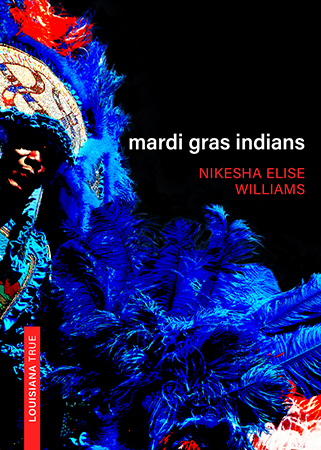
168 pages / 5.00 x 7.00 inches / 13 color images, 2 halftones
History / United States - Southern History | Social Studies / African-American History | Social Science / Customs & Traditions
Mardi Gras Indians explores how sacred and secular expressions of Carnival throughout the African diaspora came together in a gumbo-sized melting pot to birth one of the most unique traditions celebrating African culture, Indigenous peoples, and Black Americans. Williams ties together the fragments of the ancient traditions with the expressed experiences of the contemporary. From the sangamentos of the Kongolese and the calumets of the various tribes of the lower Mississippi River valley to one-on-one interviews with today’s Black masking tribe members, this book highlights the spirit of resistance and rebellion upon which this culture was built.
Nikesha Elise Williams is an award-winning author and the producer and host of the Black & Published podcast. She has received two Suncoast Regional Emmy awards for her work as a news producer. Williams is currently a freelance writer for the Washington Post, Essence, and Vox, among other publications. She lives in Jacksonville, Florida, with her family.
“The origins of the Mardi Gras Indians, like the origins of Creole New Orleans itself, are found in the kinship connections between Africans and the Indigenous people of the Gulf Coast and Mississippi River delta. Nikesha Elise Williams wades into that murky history, offering a useful commentary on Afro-Indigeneity as a mechanism of survival and cultural continuity in the face of European (and American) colonization.”—Darryl Barthé Jr., author of Becoming American in Creole New Orleans, 1896–1949
“There are certain stories, cultures, and communities whose formation could only come from the matrices of cultural intimacies in the place we now call Louisiana. Williams leads readers into the Afro-Indigenous masking traditions of Bulbancha (New Orleans), where ‘it is not the origin story that is the most important.’ At its heart, this is a book about survivance, adaptability, and resistance. It tells the stories, memories, and continuity of a people, place, culture, and practice that ‘won’t bow down / down on the ground.’”—Rain Prud’homme-Cranford, author of Miscegenation Round Dance: Poèmes Historiques and coeditor of Louisiana Creole Peoplehood: Afro-Indigeneity and Community
“Mardi Gras Indians explains a history between Indigenous and Black Americans that has usually been dismissed. Even better, it provides an appreciation for the traditions the Black masking Indians of New Orleans hold close and that make this book possible.”—Ronda Racha Penrice, author of Black American History for Dummies
Found an Error? Tell us about it.